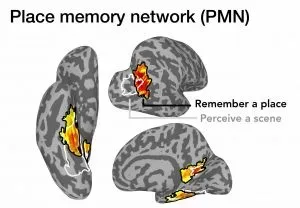What is the role of place-memory areas?
"As we navigate our surroundings, information enters the visual cortex and somehow ends up as knowledge of where we are—the question is where this transformation into spatial knowledge occurs. We think that the place-memory areas might be where this happens," says lead author Adam Steel, a Neukom Fellow with the Department of Psychological and Brain Sciences in the Robertson Lab. "When you look at the location of the brain areas that process visual scenes and those that process spatial memories, these place-memory areas literally form a bridge between the two systems. Each of the brain areas involved in visual processing is paired with a place-memory counterpart."
How was the research conducted?
For the study, an innovative methodology was employed. Participants were asked to perceive and recall places that they had been to in the real world during functional magnetic resonance imaging (fMRI), which produced high-resolution, subject-specific maps of brain activity.
Past studies on scene perception and memory have often used stimuli that participants knew of but had never visited, like famous landmarks, and have pooled data across many subjects. By mapping the brain activity of individual participants using real-world places that they had been to, researchers were able to untangle the brain's fine-grained organization.
What Did the Study Find?
In one experiment, 14 participants provided a list of people that they knew personally and places that they had actually visited, such as their father or their childhood home. Then, while in the fMRI scanner, the participants imagined that they were seeing those people or visiting those places. Comparing the brain activity between people and places revealed the place-memory areas. Importantly, when the researchers compared these newly identified regions to the brain areas that process visual scenes, the new regions were overlapping but distinct.
In another experiment, the team investigated whether the place-memory areas were involved in recognition of familiar places. During fMRI scanning, participants were presented with panning images of familiar and unfamiliar real-world locations downloaded from Google Street View. When the researchers looked at the neural activity, they found that the place-memory areas were more active when images of familiar places were shown. The scene-perception areas did not show the same enhancement when viewing familiar places. This suggests that the place-memory areas play an important role in recognizing familiar locations.
The conclusion
"Learning how the mind is organized is at the heart of the quest of understanding what makes us human." "The place-memory network provides a new framework for understanding the neural processes that drive memory-guided visual behaviors, including navigation," Robertson says.
The research team is currently using virtual reality technology to explore how representations in the place-memory areas evolve as people become more familiar with new environments.
In addition to Steel and Robertson, Madeleine Billings '20 and Edward Silson at the University of Edinburgh served as co-authors of the study.


